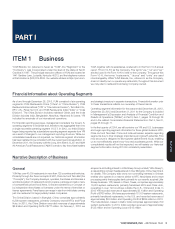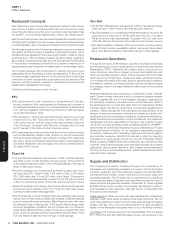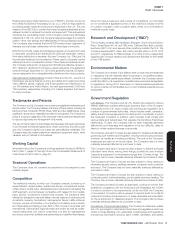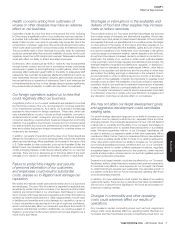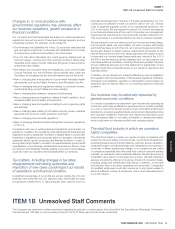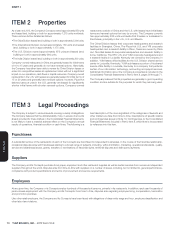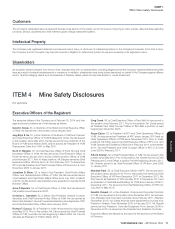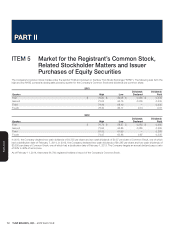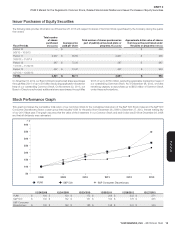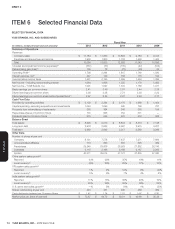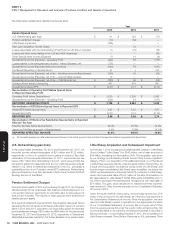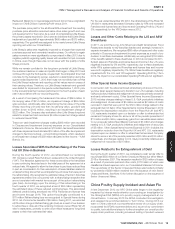Pizza Hut 2013 Annual Report Download - page 105
Download and view the complete annual report
Please find page 105 of the 2013 Pizza Hut annual report below. You can navigate through the pages in the report by either clicking on the pages listed below, or by using the keyword search tool below to find specific information within the annual report.
YUM! BRANDS, INC.-2013 Form10-K 9
Form 10-K
PART I
ITEM 1BUnresolved Staff Comments
Changes in, or noncompliance with,
governmental regulations may adversely affect
our business operations, growth prospects or
financial condition.
Our Concepts and their franchisees are subject to numerous laws and
regulations around the world. These laws change regularly and are
increasingly complex. For example, we are subject to:
•
The Americans with Disabilities Act in the U.S. and similar state laws that
give civil rights protections to individuals with disabilities in the context
of employment, public accommodations and other areas.
•
The U.S. Fair Labor Standards Act, which governs matters such as
minimum wages, overtime and other working conditions, family leave
mandates and a variety of similar state laws that govern these and other
employment law matters.
•
Anti-bribery and corruption laws and regulations, such as the Foreign
Corrupt Practices Act, the UK Bribery Act and similar laws, which are
the subject of increasing scrutiny and enforcement around the world.
•
New or changing laws and regulations in government-mandated health
care benefits such as the Patient Protection and Affordable Care Act.
•
New or changing laws and regulations relating to nutritional content,
nutritional labeling, product safety and menu labeling.
•New or changing laws relating to state and local licensing.
•
New or changing laws and regulations relating to health, sanitation, food,
workplace safety and fire safety and prevention.
•
New or changing laws and regulations relating to union organizing rights
and activities.
•
New or changing laws relating to information security, privacy, cashless
payments and consumer credit, protection and fraud.
•New or changing environmental regulations.
•
New or changing federal and state immigration laws and regulations
in the U.S.
Compliance with new or existing laws and regulations could impact our
operations. In addition, the compliance costs associated with these laws and
regulations could be substantial. Any failure or alleged failure to comply with
these laws or regulations could adversely affect our reputation, international
expansion efforts, growth prospects and financial condition or result in,
among other things, litigation, revocation of required licenses, governmental
investigations or proceedings, administrative enforcement actions, fines
and civil and criminal liability. Publicity relating to any such noncompliance
could also harm our reputation and adversely affect our revenues.
Tax matters, including changes in tax rates,
disagreements with taxing authorities and
imposition of new taxes could impact our results
of operations and financial condition.
A significant percentage of our profits are earned outside the U.S. and
taxed at lower rates than the U.S. statutory rates. Historically, the cash
we generate outside the U.S. has principally been used to fund our
international development. However, if the cash generated by our U.S.
business is not sufficient to meet our need for cash in the U.S., we may
need to repatriate a greater portion of our international earnings to the
U.S. in the future. We are required to record U.S. income tax expense
in our financial statements at the point in time when our management
determines that such funds are not permanently invested outside the U.S.
This could cause our worldwide effective tax rate to increase materially.
We are subject to income taxes as well as non-income based taxes,
such as payroll, sales, use, value-added, net worth, property, withholding
and franchise taxes in both the U.S. and various foreign jurisdictions.
We are also subject to regular reviews, examinations and audits by the
Internal Revenue Service and other taxing authorities with respect to such
incomeand non-income based taxes inside and outside of the U.S. If
the IRS or another taxing authority disagrees with our tax positions, we
could face additional tax liability, including interest and penalties. Payment
of such additional amounts upon final settlement or adjudication of any
disputes could have a material impact on our results of operations and
financial position.
In addition, we are directly and indirectly affected by new tax legislation
and regulation and the interpretation of tax laws and regulations worldwide.
Changes in such legislation, regulation or interpretation could increase our
taxes and have an adverse effect on our operating results and financial
condition.
Our business may be adversely impacted by
general economic conditions.
Our results of operations are dependent upon discretionary spending by
consumers, which may be affected by general economic conditions globally
or in one or more of the markets we serve. Some of the factors that impact
discretionary consumer spending include unemployment, disposable income
and consumer confidence. These and other macroeconomic factors could
have an adverse effect on our sales, profitability or development plans,
which could harm our financial condition and operating results.
The retail food industry in which we operate is
highly competitive.
The retail food industry in which we operate is highly competitive with
respect to price and quality of food products, new product development,
advertising levels and promotional initiatives, customer service, reputation,
restaurant location, and attractiveness and maintenance of properties. If
consumer or dietary preferences change, or our restaurants are unable
to compete successfully with other retail food outlets in new and existing
markets, our business could be adversely affected. We also face growing
competition as a result of convergence in grocery, deli and restaurant
services, including the offering by the grocery industry of convenient meals,
including pizzas and entrees with side dishes. In addition, in the retail
food industry, labor is a primary operating cost component. Competition
for qualified employees could also require us to pay higher wages to
attract a sufficient number of employees, which could adversely impact
our profit margins.
ITEM 1B Unresolved Staff Comments
The Company has received no written comments regarding its periodic or current reports from the staff of the Securities and Exchange Commission
that were issued 180 days or more preceding the end of its 2013 fiscal year and that remain unresolved.






